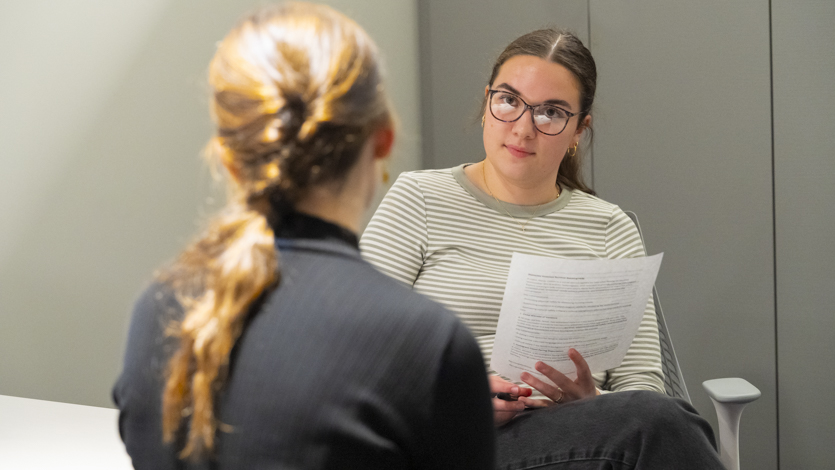New Fully Online Master of Social Work Program Debuts

October 8, 2024 — The School of Social and Behavioral Sciences is set to launch a new fully online Master of Social Work (MSW) program, as Marist continues to lead the way in innovation and experiential learning.
The program equips students to address complex and multifaceted needs within a flexible, supportive learning environment. It centers on a trauma-informed perspective, using methods in which students learn how to ethically and effectively support diverse populations in need of care.
“This approach gives students the tools to understand trauma in all its complexities, while providing knowledge and skills to address its effects,” said Dr. Katharine Dill, MSW Program Director and associate professor of social work.
This trauma-informed perspective, along with the flexible pathways and individualized support, makes Marist’s MSW program stand out. The curriculum is designed to nurture both personal and professional growth, ensuring that students develop the interpersonal skills necessary for social work practice.
Flexible Degree Pathways
The fully-online program offers two pathways to accommodate a wide range of students. The advanced standing program, which can be completed in one year, is available to students who have earned a Bachelor’s degree in Social Work from a Council on Social Work Education (CSWE) accredited institution. This pathway requires 32 credits and 650 hours of clinical internship training.
For students with degrees in related fields, such as psychology or criminal justice, the two-year program provides a comprehensive social work education, including 1,100 hours of clinical internship training. Both cohorts begin in June 2025, with students engaging in internships in settings like hospitals, family counseling centers, and child welfare organizations.
“Many students need the flexibility to learn at their own pace while balancing work, family, and other responsibilities,” said Dr. Dill. “This program provides that flexibility while still offering Marist’s signature hands-on learning experience.”
Dedicated faculty, such as Dr. Katharine Dill (pictured above), will not only teach courses but also guide MSW students through the program, ensuring meaningful and effective internship and professional experiences. Photo by Carlo de Jesus/Marist College.
The Flexibility of Online Class Meets the Power of Hands-On Learning
The program goes beyond traditional online learning by fostering strong relationships between students and faculty with frequent one-on-one advisement as well as role-play scenarios and other real-world simulations.
An MSW practicum, known as the "signature approach" of social work education, gives students the chance to learn through real-life experiences. They apply the theory and research they've explored in class while practicing their skills with the guidance of experienced social workers. These hands-on opportunities help students improve their abilities in working with individuals, families, and communities to create meaningful change.
"As a practicing licensed clinical social worker, I will not only have the privilege of sharing research-informed clinical experience in seminar courses, but I will also have the opportunity to help our students create partnerships with agencies in their areas where they can make a direct impact and expand the reach of our Marist community, said Dr. Maurya W. Glaude, MSW Practicum Education Coordinator.
Dr. Maurya W. Glaude, MSW Practicum Education Coordinator (left) and Dr. Katharine Dill, MSW Program Director (right). Photo by Nelson Echeverria/Marist College.
Whether students are pursuing the one-year advanced standing or the two-year degree, they will work closely with advisers and mentors to secure high-quality placements in their communities.
“We really advocate for the student," says Dr. Dill. "We take the time to ensure that their internship is not only flexible but also provides quality supervision and a meaningful learning experience."
"The School of Social and Behavioral Sciences has a long history of training students to provide direct human services," said Dr. Deborah Gatins, the school’s dean. "The MSW program is a natural progression in our mission to support human growth and development. With a shortage of mental health care workers in our country, the timing could not be better to launch this program."
The MSW program has achieved its first benchmark in the pre-candidacy phase of CSWE’s Educational Policy and Accreditation Standards process, demonstrating Marist’s commitment to aligning the program with the council’s standards. This milestone signifies that the program is making steady progress toward full accreditation as it moves to the next stages of the process.



